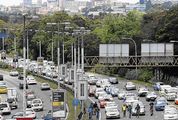State has plan to trim obesity by 10%
by Estelle Ellis,
2016-01-11 05:48:35.0
HEALTH Minister Aaron Motsoaledi has plans to put South Africans on a diet and aims to reduce obesity by at least 10% during the next few years.
SA has been singled out as one of the three fattest nations in the world in research conducted by pharmaceutical company GlaxoSmithKline last year.
According to the Strategy for the Prevention and Control of Obesity in SA, set out in a 57-page document published by the Health Department, the government will start campaigning for laws imposing a sugar and fat tax.
It also wants to develop new rules for sugar and fat content in processed food; improve food labelling; get fast-food outlets to offer healthy meals; draft guidelines for school tuckshops; and prevent the display of sweets at store check-out points.
Unveiling the plan, Dr Motsoaledi said his department wanted to reduce the number of obese people by 10% by 2020.
"We have set ourselves quite ambitious targets. I believe that this target is achievable if efforts are synergised and consistent.
"At the heart of this national strategy for the prevention and control of obesity is the realisation that noncommunicable diseases (like obesity, diabetes and high blood pressure) have placed a dire threat on the physical and mental health of the South African population," he said.
Poverty, an uneven distribution of wealth, lack of education, rapid urbanisation and the built environment were also among the factors contributing to the rising obesity epidemic, he said.
Deputy Health Minister Joe Phaahla said obesity was a major health concern and its effects and cost extended to individuals, families, communities, the health service and society as a whole.
"Most South Africans consume less fruits and vegetables and more fat-and sugar-containing foods," Dr Phaahla said.
Basic Education Minister Angie Motshekga also pledged her support for the plan.
A recent study by the University of Johannesburg: Centre for Social Development in Africa showed that where schools provided a healthy breakfast and lunch, the nutritional status of pupils showed a marked increase, she said.
According to the latest National Income Dynamics Study, 33% of women and 11% of men in SA over the age of 15 are obese.
The highest percentage of obese people are found in the cities, where 42% of women are obese.
Researchers, led by experts in public health from the country’s main medical schools, identified four main causes of the obesity epidemic in the country.
These are insufficient physical activity, lack of knowledge, poor eating habits learned in childhood, and poor diet.

The level of obesity in SA puts it in the 20 fattest countries in the world. A UK programme that has made substantial gains in the fight against obesity is one SA should adapt. Picture: SUNDAY TIMES
HEALTH Minister Aaron Motsoaledi has plans to put South Africans on a diet and aims to reduce obesity by at least 10% during the next few years.
SA has been singled out as one of the three fattest nations in the world in research conducted by pharmaceutical company GlaxoSmithKline last year.
According to the Strategy for the Prevention and Control of Obesity in SA, set out in a 57-page document published by the Health Department, the government will start campaigning for laws imposing a sugar and fat tax.
It also wants to develop new rules for sugar and fat content in processed food; improve food labelling; get fast-food outlets to offer healthy meals; draft guidelines for school tuckshops; and prevent the display of sweets at store check-out points.
Unveiling the plan, Dr Motsoaledi said his department wanted to reduce the number of obese people by 10% by 2020.
"We have set ourselves quite ambitious targets. I believe that this target is achievable if efforts are synergised and consistent.
"At the heart of this national strategy for the prevention and control of obesity is the realisation that noncommunicable diseases (like obesity, diabetes and high blood pressure) have placed a dire threat on the physical and mental health of the South African population," he said.
Poverty, an uneven distribution of wealth, lack of education, rapid urbanisation and the built environment were also among the factors contributing to the rising obesity epidemic, he said.
Deputy Health Minister Joe Phaahla said obesity was a major health concern and its effects and cost extended to individuals, families, communities, the health service and society as a whole.
"Most South Africans consume less fruits and vegetables and more fat-and sugar-containing foods," Dr Phaahla said.
Basic Education Minister Angie Motshekga also pledged her support for the plan.
A recent study by the University of Johannesburg: Centre for Social Development in Africa showed that where schools provided a healthy breakfast and lunch, the nutritional status of pupils showed a marked increase, she said.
According to the latest National Income Dynamics Study, 33% of women and 11% of men in SA over the age of 15 are obese.
The highest percentage of obese people are found in the cities, where 42% of women are obese.
Researchers, led by experts in public health from the country’s main medical schools, identified four main causes of the obesity epidemic in the country.
These are insufficient physical activity, lack of knowledge, poor eating habits learned in childhood, and poor diet.





















Change: -0.95%
Change: -1.26%
Change: -1.23%
Change: -0.89%
Change: -2.34%
Data supplied by Profile Data
Change: 0.00%
Change: 0.00%
Change: -0.95%
Change: 0.00%
Change: 0.00%
Data supplied by Profile Data
Change: -0.03%
Change: 0.00%
Change: -0.02%
Change: 0.00%
Change: -0.58%
Data supplied by Profile Data
Change: 0.00%
Change: 0.00%
Change: 0.00%
Change: 0.00%
Change: 0.00%
Data supplied by Profile Data